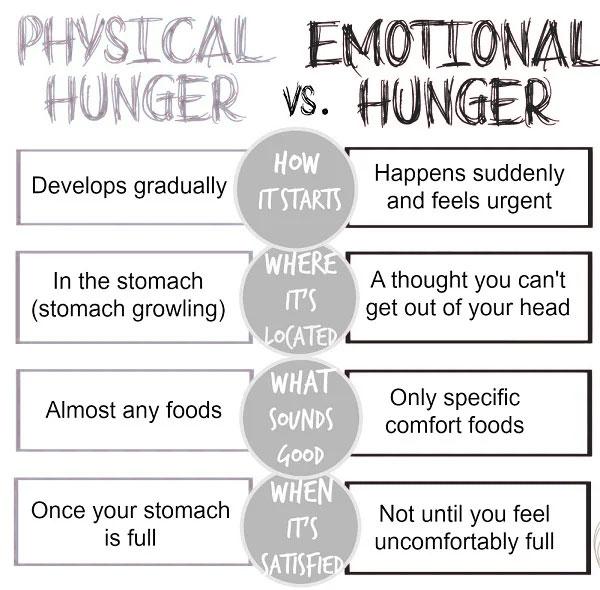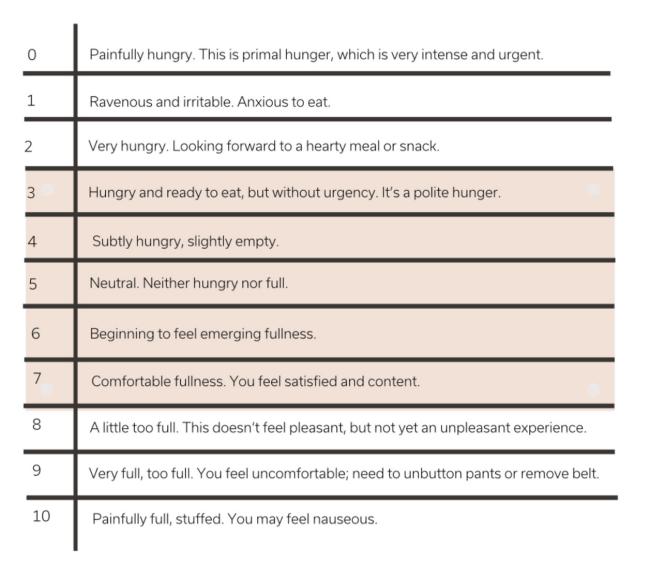
Understanding Hunger and Fullness Cues
What is hunger?
- Hunger is an essential biological cue.
- Hunger ensures you obtain the fuel and nutrients needed for survival.
- Your body uses a complex system of communication between the brain, gut, pancreas, liver, and fat tissue to regulate hunger signals.
Hunger has become pathologized - we treat a normal, necessary body signal as if it were a problem, disease or something to fear or suppress.
Benefits of honoring hunger cues
- Increases the likelihood of consuming the fuel and nutrients your body needs.
- Optimizes your body’s metabolic rate.
- Minimizes overeating and restrict-binge cycles.
- Decreases risk of disordered thoughts and behaviors around food.
Barriers to honoring hunger cues
A diet mentality: Encourages you to ignore hunger and can distort hunger cues.
Busy schedule or irregular routine: Leads to delayed or skipped meals.
Stress, anxiety or depression: May either mask hunger cues or prompt emotional hunger.
Lack of sleep: Can disrupt hunger and fullness hormones.
Work or social settings: Food intake may be restricted or judged.
Medications: May suppress or stimulate hunger.
Types of hunger
Physical vs. emotional hunger
Tips to honor hunger cues
Challenge food rules that dictate when or how much you should eat.
Create a consistent eating routine that allows you to eat every few hours.
Check in with yourself before eating to confirm what type of hunger you are experiencing.
Focus on fiber and protein, which will help delay when you feel hungry again.
Keep easy-to-grab options available, so you are prepared when hunger strikes.
Reduce distractions while eating to help you focus on how your hunger is subsiding.
Set alarms, if needed, to remind you to check in with your hunger.
Prioritize self-care, such as sleep and stress management.
Benefits of honoring fullness cues
Less digestive discomfort such as bloating, heartburn and nausea.
Fewer blood sugar spikes and crashes that can result from large meals.
Supports hunger and fullness signals, since frequent overeating can make the stomach and brain less responsive to fullness cues.
Less guilt and shame around food, which is often triggered by overeating.
Barriers to honoring fullness cues
A diet mentality: Can prompt “last-chance” eating.
Clean plate habit: Encourages eating past the point of comfortable fullness.
Fear of food waste or scarcity: Concerns about cost of food or access to food can prompt overeating.
Initiating eating when overly hungry: Prompts you to eat too much, too quickly.
Fast eating: Your brain and stomach don’t have time to communicate with each other that you’re full.
Emotional eating: Eating for comfort or reward means physical fullness is not honored. Distracted eating: Almost always leads to overeating.
Medications: May interfere with fullness cues.
Portions and palatability: Larger portions, and foods high in sugar, fat and sodium, can lead to overeating.
Tips to honor fullness cues
Slow down your eating - it takes 20 minutes for your stomach to tell your brain you are full.
Start with smaller portions, knowing you can have more if you are still hungry after 20 minutes.
Reduce distractions while eating to help you focus on emerging feelings of fullness.
Pause mid-meal to check in with yourself.
Minimize hyper-palatable foods, which can override fullness signals.
Prioritize self-care, such as sleep and stress management.
Challenge thoughts about food waste and access to food. Where did they come from? Are they true?
Hunger and fullness scale
Try to stay between 3 and 7!



